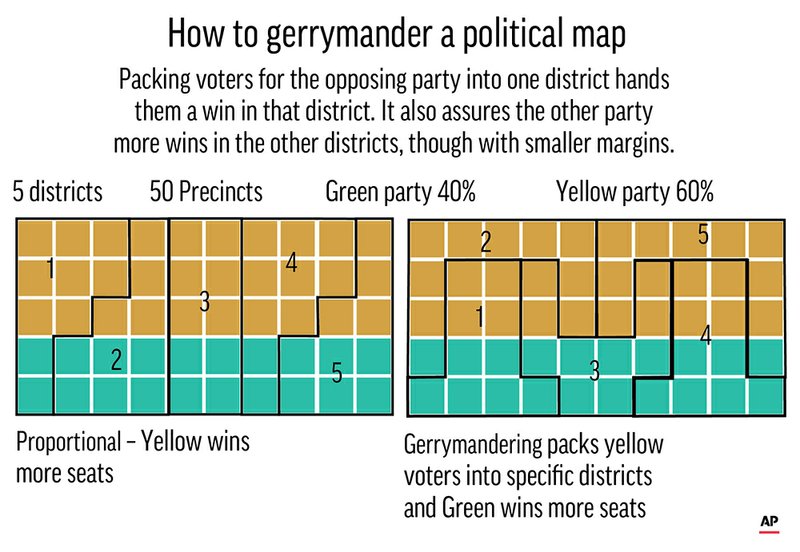Politics
States poised to take up fight over partisan gerrymandering

JEFFERSON CITY, Mo. (AP) — The battle for political advantage in state capitols is poised to become more intense after the U.S. Supreme Court declared that federal judges have no role in settling disputes over partisan gerrymandering.
The ruling this week could empower Republicans and Democrats who hold full control of state legislatures and governor’s offices to become even more aggressive in drawing districts to their benefit after the 2020 census.

It could shift legal challenges against partisan gerrymandering to state courts and prompt more efforts to reform redistricting procedures through amendments to state constitutions.
Ultimately, it also could mean that voters upset with the party in power must seek change the old-fashioned way — by electing different lawmakers, no matter how difficult that might seem in heavily gerrymandered districts.
“It just means the next elections are even more important,” said Mindy Nagel, a Cincinnati Democrat whose home is split between two Republican-held congressional districts. “We need to focus on state politics big time.”
Ohio is one of several states immediately affected by the Supreme Court’s ruling, which overturned lower court decisions that North Carolina Republicans and Maryland Democrats had unconstitutionally gerrymandered congressional districts to their political advantage.
Writing for the court’s 5-4 majority, Chief Justice John Roberts said that although the cases provided “blatant examples of partisanship driving districting decisions,” federal courts have no authority to determine whether partisan gerrymandering is unconstitutional.
The ruling is likely to lead to the dismissal of similar federal lawsuits in Michigan, Ohio and Wisconsin.
Courts in Michigan and Ohio had ordered new districts to be drawn for the 2020 elections after ruling that Republican officials engaged in illegal partisan gerrymandering. A retrial on a partisan gerrymandering claim in Wisconsin had been scheduled to begin in July.
Instead, the 2020 elections will proceed under the same districts used for the past decade. An Associated Press statistical analysis of the 2016 and 2018 elections found that congressional districts in North Carolina and Ohio produced a consistent advantage for Republicans. The AP’s analysis also found a persistent Republican advantage in state House or Assembly districts in Michigan and Wisconsin.
“The fact that these districts aren’t fairly drawn makes it a tough slog for us,” Michigan Democratic Party Chairwoman Lavora Barnes said. “But we feel good that there are places in Michigan, despite the gerrymandered districts, where we can make inroads and where we can win seats that have been drawn specifically for Republicans to win.”
Michigan Democrats have said much the same thing before — with little to show for it in the state legislature.
But “if voters are sufficiently ticked off … they may often be able to overcome partisan gerrymandering through sheer electoral force,” said Justin Levitt, a professor at Loyola Law School in Los Angeles who tracks redistricting nationwide. “It’s not realistic to expect that would happen everywhere, but it may happen in enough places to send a message.”
In Ohio, which lost two U.S. House seats after the 2010 census, the map enacted by Republican officials led to a 12-4 Republican congressional majority that has stood since the 2012 elections. Last year, Republicans received 52% of the vote statewide but won 75% of the seats.
One of the biggest beneficiaries has been Republican U.S. Rep. Steve Chabot, whose Cincinnati-based district added GOP-dominated Warren County in the remapping. While Democrats have had the upper hand politically in the Cincinnati area in recent years, the city is divided between two GOP congressmen .
Chabot commended the Supreme Court, saying by email that Ohio has already passed redistricting reform, and “it would be an unjust usurpation for the federal courts to substitute their opinions for those of the Ohio legislature and voters.”
Michigan’s Republican House Speaker, Lee Chatfield, also praised the Supreme Court, saying it “did the right thing upholding the will of the voters and leaving state policy decisions to the people of Michigan and their elected representatives.”
Voters in Ohio, Michigan, Colorado, Missouri and Utah all approved ballot measures in 2018 that were intended to reduce partisanship during the next round of redistricting in 2021. Ohio’s measure requires bipartisan support for new maps to last for 10 years. Missouri’s measure requires a nonpartisan demographer to draw state legislative districts designed to achieve “partisan fairness” and “competitiveness.” The other states adopted independent or bipartisan commissions to draft district lines.
About 18 states have passed some sort of redistricting procedures designed to keep partisanship in check. More are pursuing such measures.
Virginia’s General Assembly in February approved a constitutional amendment that would create a 16-member commission of lawmakers and citizens to draw congressional and state legislative districts after the 2020 census. The measure must be approved again next year by lawmakers for it to go on the statewide ballot.
New Hampshire’s Democratic-led Legislature passed a bill in June to create a 15-member redistricting commission that would present maps to the Legislature for approval. Republican Gov. Chris Sununu has not taken a public position yet on the bill.
Citizen ballot initiatives aren’t allowed in about half the states, including in Texas, Alabama, Georgia and Louisiana — all places where lawsuits over racial gerrymandering have been filed.
Former Obama administration Attorney General Eric Holder, who leads the National Democratic Redistricting Committee, said his group will continue to pursue racial gerrymandering claims in federal courts and partisan gerrymandering claims in state courts. The group also is looking into supporting constitutional amendments in 2020 to create independent redistricting commissions in New Hampshire, Arkansas and Oklahoma.
“Even with no federal guardrails on gerrymandering, this fight is really far from over,” Holder said.
In North Carolina, litigation challenging partisan gerrymandering in state court already is teed up for trial in mid-July.
Common Cause and the state Democratic Party — both involved in the federal case decided Thursday — also sued last November challenging the state legislative districts drawn by Republicans. That case claims the maps violate the state constitution’s provisions that protect freedom of speech, declaring that “all elections shall be free” and ensuring people are protected by laws equally.
Last year, the Pennsylvania Supreme Court struck down congressional districts based on a state constitution that contains similar wording declaring that “elections shall be free and equal.” The Democratic-majority high court then adopted new districts, under which Democrats gained four more seats in 2018 than they had won in 2016.
In North Carolina, “we still feel like this is an excellent opportunity (for) … ultimately the state Supreme Court to rule in our favor to say partisan gerrymandering is unconstitutional,” Common Cause North Carolina Executive Director Bob Phillips said. “So we haven’t lost hope.”







